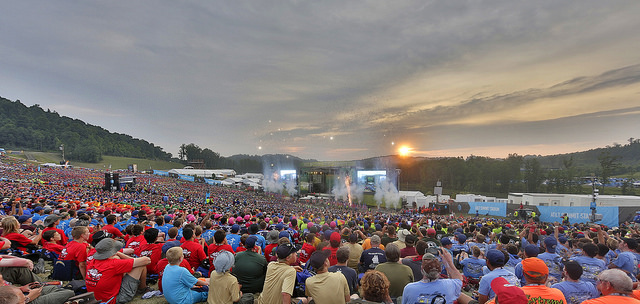
Paying for the Privilege of Two Weeks in a Tent
By Ed Lynes
For the past two weeks, I have been in the mountains of West Virginia for the Boy Scouts of America’s 2017 National Jamboree (we’ve been in the news lately thanks to our special guest). Every four years, 30,000 Scouts from around the country gather to explore The Summit Bechtel Reserve, meet fellow Scouts, and have a truly once-in-a-lifetime experience. This event is largely organized and run by volunteers: adults who pay for the privilege of living in a tent, taking cold showers daily, and working 12-hour days to deliver the Jamboree program.
So, why would I, and 5,000 other adult volunteers, spend two weeks of vacation doing this?
The answer reveals a lot about the ability to inspire loyalty – from customers, employees, partners, and others – to your organization. If the Boy Scouts can convince people to pay $1,000 for the privilege of cleaning porta-johns (true story!), there’s a lesson for those looking to offer services with far lower cost and infinitely more value. In watching my fellow volunteers, I see three common threads for companies looking to engender this level of affinity with their stakeholders:
- Clarity of purpose
- Shared values
- Audience-focused
Clarity of purpose
Every volunteer I’ve encountered this week is united in their desire to provide an incredible experience for the young people at the Jamboree. From the previously mentioned porta-john volunteers, to the leaders camping alongside Scouts, to the people running different adventure areas, ask any one of them why they’re here, and they’ll say: “For the boys.” It’s clarity of purpose that allows for alignment, regardless of someone’s tactical role.
Operational excellence is important to any organization, but it’s essential to define a clear, high-level strategic objective. For employees (or, at the Jamboree, volunteers) clarity of purpose permits a level of empowerment for staff at all levels. Since they understand the clear, ultimate objective of the organization, they feel free to make decisions and solve problems themselves, and know others will support them if they are working toward the ultimate goal.
This clarity is equally important for customers (or Scouts). It provides a set of expectations about how they ought to experience the brand. It also provides a conduit for evangelism: by understanding their purpose in the context of the brand, they know how to best articulate their experiences to others. It’s that power that the Jamboree relies on to draw a largely new audience every four years: powerful word-of-mouth marketing.
Purpose is synonymous with the ever-important “Why” that brands often fail to articulate. Operational excellence defines what brands do – but aligning everyone behind purpose defines why they do it.
Shared values
Members of the Boy Scouts share a codified set of values: the Scout Oath and the Scout Law. These values provide the framework of the Boy Scouts’ brand story, and define those affiliated with the programs as a single community. Even when you meet a new person from a different part of the nation at the Jamboree, the relationship begins at a level of shared understanding about worldview and values that make teamwork possible quickly.
In today’s social-media driven environment, organizations are obsessed with building communities that support their product, and evangelize for them. At the root of every community is trust, and trust is built around values.
Stories have been proven the most effective method for organizations to communicate their values in a way that is memorable, and easily understood. As the Woden blog has shared many times, the root of storytelling is in communicating fundamental truths. For organizations, though, step one is defining those values and building said narrative for their audience.

Audience focused
Finally, great organizations emphasize their audience over themselves. Scouting offers young people the types of adventures that are typically unavailable in other programs, and leadership opportunities that are difficult to match through other extracurricular activities. For volunteers, they have the chance to contribute their skills in rewarding ways they may not find in their vocations.
For the 2017 National Jamboree, the Boy Scouts established a partnership with Snapchat to tell it story nation-wide. This partnership was advanced by a former Scout working at the company; when asked how he could be thanked, he said “Everything I got from Scouting is more than enough thanks.”
It’s pretty clear who the hero of the Boy Scouts’ story is. It comes through loud and clear at the Jamboree. Staff don’t have much time off. Adults do not get to participate in activities. Youths pay less. Everything is aligned toward the same message: this is about a great experience for the Scouts.
Organizations work the same way. The great ones place their audience at the center of their story. They establish a laser-focus on who they serve, empowering their audience as their hero, and employees and partners as mentors to guide them. When a company starts worrying more about protecting its own brand, it loses its way: note how quickly much of the great narrative around the Jamboree was eroded by the BSA’s initial, milquetoast response to the President’s remarks on Monday (clearly written with the organization in mind) in lieu of today’s clearer, more authentic one (written to the brand’s true hero).
Tomorrow I return to the real world: the Woden office in Philadelphia, supporting our team, and growing our business. I’ll take a long shower, eat some real food, and enjoy sleeping in my own bed. I’ll also return with some powerful insight for our clients.
It wasn’t the accommodations (tents), food (awful and shelf-stable), or weather (hot!) that brought 35,000 people to West Virginia these past two weeks. It was shared belief in the story of the Boy Scouts: our ability to shape and change the lives of young people for the better. After being immersed in that for two weeks, I’m ready to get back to work, telling more powerful stories for our clients.
Ed Lynes is a founding partner at Woden. Whatever your storytelling needs may be, let Woden help. Read our free StorytellingBlueprint, or send us an email at connect@wodenworks.com to discuss how we can help tell your story.


